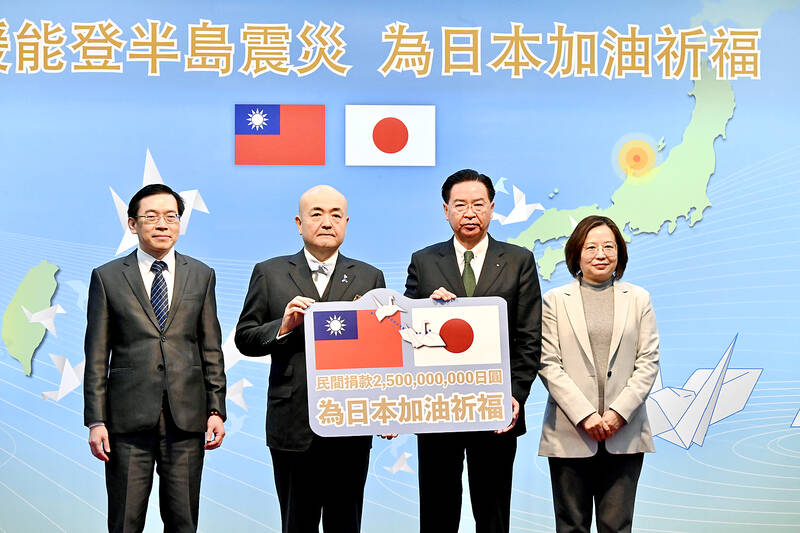Japan’s de facto ambassador to Taiwan yesterday thanked Taiwanese for donating more than ¥2.5 billion (US$16.9 million) for earthquake relief efforts.
A magnitude 7.5 earthquake that struck Ishikawa Prefecture’s Noto Peninsula on Jan. 1, followed by multiple aftershocks, claimed more than 230 lives, with 19 people still missing as of Thursday.
The Taiwanese government on Jan. 4 announced that it was donating ¥60 million and opening disaster relief accounts to accept donations from the private sector from Jan. 5 to Friday last week.

Photo: George Tsorng, Taipei Times
The accounts collected more than 134,000 donations totaling more than ¥2.5 billion, the Ministry of Health and Welfare said.
Minister of Foreign Affairs Joseph Wu (吳釗燮), on behalf of Taiwan, yesterday presented the donation to Kazuyuki Katayama, chief representative of the Japan-Taiwan Exchange Association’s Taipei Office.
Representatives from companies and private groups that joined the donation campaign — including Cathay Financial Holding Co, Hon Hai Technology Group, E.Sun Financial Holding Co, Syncmold Enterprise Group, Taiwan High Speed Rail Corp, Taishin Bank, CTBC Financial Holding Co. Ltd, Hiwin Technologies Co, Taiwan Soka Association, Andrew Charity Association and Golden Friends Corp Foundation — attended the ceremony.
Katayama thanked senior Taiwanese officials for conveying their condolences and willingness to assist right after the earthquake, as well as the Taiwanese public for their donations and messages of encouragement, which were very heart-warming.
The donations are another testament to the friendship between Taiwan and Japan, he said, adding that his friends in Japan repeatedly asked him to convey their sincere gratitude to Taiwanese.
Post-disaster reconstruction work continues around the clock, as water, electricity and gas supplies have not yet been restored in some areas and many people are unable to return home due to collapsed houses and blocked roads, he said.
With the kind help of Taiwanese, the earthquake-stricken areas can hopefully be reconstructed soon, he said.
Taiwan-Ishikawa Association member Shigehito Tokumitsu said that he was deeply grateful to Taiwan for donating and assisting in rescue efforts.
Tokumitsu shared that he had received a letter written by 20 elementary-school students, asking him to convey the care and concern of Taiwanese to Japan, which moved him to tears.
The warmth and care shown by Taiwanese would greatly encourage victims of the earthquake and give them courage along the road to recovery, he said.
The courage, perseverance and confidence of Taiwanese enable them to be kind to their neighbors, he said.
Whenever a major disaster occurs, Taiwan and Japan have always lent a helping hand to support each other, Wu said.
The tight bond between Taiwan and Japan is most evident when either side is in need, he said.
“We are each other’s strongest supporters,” he said.
The donation is not only a number, but an embodiment of the kind intentions of countless Taiwanese, he said, adding that many Taiwanese, including himself, are concerned about the well-being of people in the disaster area, as Ishikawa has been experiencing heavy snowfall recently.

Palauan President Surangel Whipps Jr arrived in Taiwan last night to kick off his first visit to the country since beginning his second term earlier this year. After arriving at Taoyuan International Airport at around 6:30 pm, Whipps and his delegation were welcomed by Minister of Foreign Affairs Lin Chia-lung (林佳龍). Speaking to gathered media, the Palauan leader said he was excited and honored to be back in Taiwan on his first state visit to Taiwan since he was sworn in this January. Among those traveling with Whipps is Minister of State Gustav N. Aitaro, Public Infrastructure

President William Lai (賴清德) yesterday thanked Palau for its continued support of Taiwan's international participation, as Taipei was once again excluded from the World Health Assembly (WHA) currently taking place in Switzerland. "Palau has never stopped voicing support for Taiwan" in the UN General Assembly, the WHO and other UN-affiliated agencies, Lai said during a bilateral meeting with visiting Palau President Surangel Whipps Jr. "We have been profoundly touched by these endorsements," Lai said, praising the Pacific island nation's firm support as "courageous." Lai's remarks came as Taiwan was excluded for the ninth consecutive year from the WHA, which is being held in

RESOLUTIONS DEBATE: Taiwan’s allies said that UN and WHA resolutions cited by China and other nations ‘do not determine Taiwan’s participation in WHO activities’ A proposal to invite Taiwan to this year’s World Health Assembly (WHA) was rejected on Monday, resulting in Taipei’s absence from the annual meeting for a ninth consecutive year, although partners spoke up for Taiwan’s participation at the first day of the meeting. The first agenda item after the opening was a “two-on-two debate” on a proposal to invite Taiwan to participate at the WHA as an observer. Similar to previous years, two countries made statements in favor of the proposal, while two others expressed their opposition. Philippine Secretary of Health Teodoro Herbosa, president of the 78th WHA, accepted the WHA General Committee’s

At least three people died and more than a dozen were injured yesterday afternoon when a vehicle struck a group of pedestrians in New Taipei City’s Sansia District (三峽). The incident happened at about 4pm when a car rammed into pedestrians at an intersection near Bei Da Elementary School. Witnesses said the sedan, being driven at a high speed, ran a red light, knocking scooters out of the way and hitting students crossing the road before careening into a median near the intersection of Guocheng and Guoguang streets. The incident resulted in three deaths and 13 injuries, including the driver, a 78-year-old man